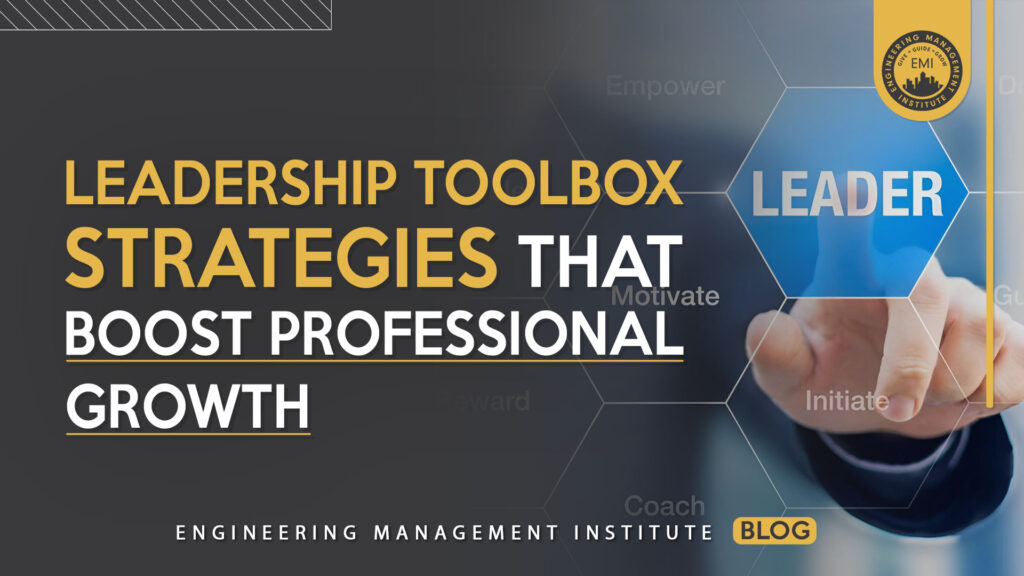Whether you’re a novice or a seasoned pro, here are some tactics to build upon your leadership skills to help set you apart from the rest and support your professional growth.
Show Up as the Leader You Should Have
Sometimes your leadership can show up as less than stellar. You can ruminate and complain all you want, but here’s the thing: management is human; it’s true they may not consider all things and all people all the time.
Are some leaders better than others? Sure. You likely have ideas on how your boss should be doing things differently. However, this is simply a stimulus — you get to choose how to respond. If you quietly tell yourself that leadership lacks in one (or some) areas, then ask yourself how you can fill in the gaps. What should they be doing differently? If it’s within your boundaries, go out and do these things yourself within the confines of your job scope to support your professional growth.
For instance, if it pains you to see leaders acting rudely, make it a point to treat others with respect. If leadership isn’t the most communicative, then take the initiative to start a communication pattern.
By filling in some of those leadership gaps within reason, you can start to form personal habits that will translate to your future leadership position and contribute to your professional growth.
Don’t Assign Your Career Path as “Right” or “Wrong”
What if there were no such thing as a ‘wrong’ or a ‘right’ career path?
Picture this: you accept a job, relocate out of state, and start over at a new company only to realize it’s not at all what you thought. Many people might state that it was a ‘wrong’ career move on your part. But that’s not very helpful to your situation, is it? What if career paths don’t have to carry a label of right or wrong? You might wonder, “How can that be?”
Maybe you could be open to the fact that there is value in all your experiences—even the unfavorable ones. Hear me out for a moment. You lived through a process that did not produce the outcome you had hoped for. Along this journey, you experienced things, people, and places you had never known. You tried a new job, new employer, and new culture. Rather than assigning a label of right or wrong, you could instead view it as a piece of valuable information. The information of knowing what you don’t want for yourself is as valuable as knowing what you do want for yourself and can inform your professional growth.
Avoid Hunting for a Dream Job
At some point or another, most young professionals visualize their version of a dream job, which is fine; it’s good to set goals and have future visions! However, some people can take this activity too far—they may meticulously analyze job descriptions out of fear. It’s possible that a reasonable job posting may get passed over if those job descriptions don’t precisely satisfy their ‘dream job’ criteria. Essentially, some people might end up looking for perfection. But there is no such thing as a perfect job! Jobs with all the right conditions that offer the perfect compensation package, with the perfect smorgasbord of colleagues, in the perfect location are not a likely find.
Life is about contrasts, and that includes your career.
Every job can be a stepping stone in your career path. Every job will come with the good and the not so good. There will always be a balance between your values and your job duties, including culture. Most importantly, there will always be things to learn, people to meet, and mistakes to be made (and learn from), all of which contribute to your professional growth.
Those are the things that make a career worthwhile!
Be an Effective Leader by Encouraging Critical Thinking
Some leaders like to give orders, instructions, and directives. Other leadership styles promote blame or criticism. Some people claim great leaders are persuasive, assertive, and outspoken. The features of great leadership are up for debate—we could talk about that all day.
While opinions differ, I’d like to share what I believe is a concrete leadership trait:
Great leaders don’t always provide answers and direction. Rather, they ask intelligent questions, enabling employees to self-reflect, critically think, and problem-solve on their own fruition. It is a continuous, mental-improvement process that employees can apply with their own colleagues.
The added benefit of guiding people to unravel answers for themselves is that they can own their solutions. This can help people create a true sense of ownership over their work and support their professional growth.
I challenge you to try it the next time someone comes to you for help with a complex dilemma. Try asking a series of thoughtful questions to help guide them toward self-discovery of their own answer. It is a powerful skill that can set you apart from other leaders!
About the Author: Gina Covarrubias

Gina is founder of Deliberate Doing, an exclusive STEM professional development service dedicated to helping engineers optimize their careers. She is the authority on establishing a purposeful career with her book, Career Purpose: When Work Isn’t Working for You. Whether speaking or coaching, she offers practical guidance for early and mid-level engineers.
Gina’s distinctive background blends life coaching expertise with 12+ years engineering/technology experience in the government, academic, and corporate environments, all within the aerospace sector.
Sources/References:
AEC PM Certification
AEC PM Connect
Project Management Accelerator™
Engineering Leadership Accelerator™
Keynote Speaking






